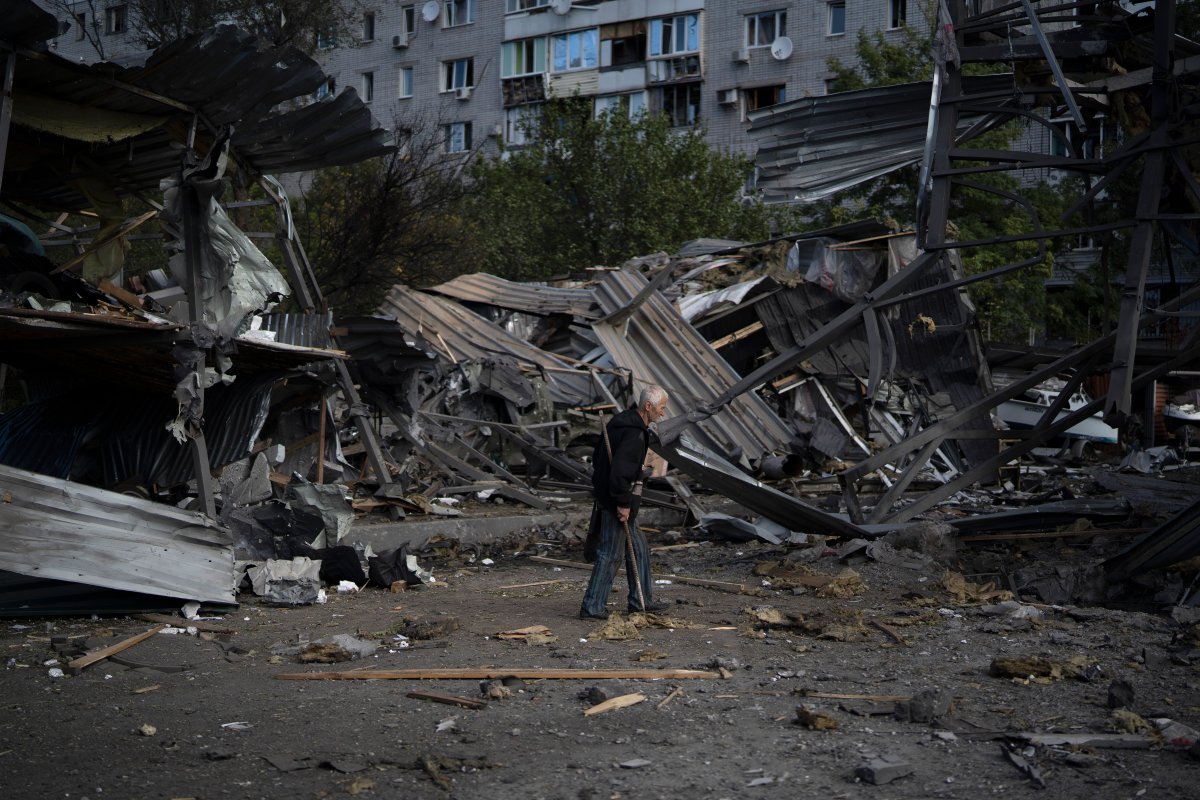Moscow’s recent attacks in Ukrainian cities are a “sign of weakness” as Kyiv continues to claw away at Russian-held territory, NATO’s secretary general says.

Jens Stoltenberg told reporters at a news conference Tuesday that Russian President Vladimir Putin is “failing in Ukraine” amid reports Moscow bombed civilian cities earlier in the day and on Monday.
“What we saw yesterday is actually a sign of weakness because the reality is that they’re not able to make progress on the battlefield. Russia is actually losing on the battlefield. They’re giving up territory because they don’t have the capabilities to stop the Ukrainian forces making advances,” he said.
“The way they are able to respond is by indiscriminate attacks on Ukrainian cities, hitting civilians, critical infrastructure and of course, this causes suffering and damage on Ukraine, but in many ways reflects the lack of alternatives for President Putin. They are losing ground, they have lost the momentum and they have to revert to missile strikes and air strikes in a way we saw yesterday and actually today.”
Stoltenberg’s comments come after a series of Russian missile strikes in Ukrainian cities this week, the latest being Tuesday in Zaporizhzhia.
Missiles struck a school, a medical facility and residential buildings in the city, local officials said. At least one person was killed. On Monday, 19 people died and 105 people were wounded in missile attacks that targeted critical infrastructure facilities in Kyiv and 12 other regions. More than 300 cities and towns were without power, from the Ukrainian capital all the way to Lviv on the border with Poland.
Many of the attacks occurred far from the war’s front lines where Ukraine has made significant gains in an ongoing counteroffensive. Kyiv has retaken some Russian-occupied towns, and Putin has responded by ordering a partial mobilization and illegally annexing four regions in what has been seen as an escalation in the seven-month-long war.
Putin’s decisions show the war is “not going as planned,” Stoltenberg said.
“Russia has conducted similar attacks earlier in the war. It has been some time since we’ve seen similar attacks against Kyiv and cities in the western part of the country, but we have seen attacks in cities in Kherson, in Zaporizhzhia, in other parts of Ukraine actually quite regularly,” he said.
“These are attacks against cities; civilians are killed, civilian infrastructure is targeted and this is unacceptable and this is something which goes against international law.”
Ukraine pleads for air weapons as NATO defence ministers meet
Stoltenberg’s news conference on Tuesday was held on the eve of a two-day meeting of NATO defence ministers where Ukraine aid will likely be discussed.
Canada, a founding NATO member, announced on Tuesday it would send 40 combat engineers to Poland to help train Ukrainian troops on engineer reconnaissance, explosives, mining and de-mining.

Meanwhile, Ukrainian President Volodymyr Zelenskyy asked G7 leaders on Tuesday to urgently supply the nation with more air defence weapons following the missile strikes. The alliance committed to support Ukraine for as long as it takes, adding in a statement after a leaders’ call that any use by Russia of nuclear weapons would be met with “severe consequences.”
Ukraine needs a wide range of different weapons, including artillery and armoured vehicles, Stoltenberg said. With the war showing no signs of ending anytime soon, it will also need a constant supply of that aid, including non-lethal materials like fuel and communications systems, he added.
However, Stoltenberg did single out the “urgent need” for air defence systems on Tuesday.
“These air defence systems are making a difference because many of the incoming missiles were actually shot down by the Ukrainian air defence systems provided by NATO allies. But not all of them were shot down, so there is a need for more,” he said.
“They need almost everything and allies are providing unprecedented support because they understand we have a moral, political and security interest in ensuring Ukraine wins the war against President Putin.”

Russia has called its actions in Ukraine since the Feb. 24 invasion a “special operation” that it says is not designed to occupy territory, but to destroy its southern neighbour’s military capabilities and capture what it regards as dangerous nationalists. It has denied deliberately attacking civilians.
The West has dismissed this and called it an attempt at an imperialistic-style land grab. In response, Canada and its allies have rallied around Ukraine to provide it with military and financial support, while also economically punishing Russia and its allies with severe sanctions.
— with files from The Associated Press and Reuters





Comments